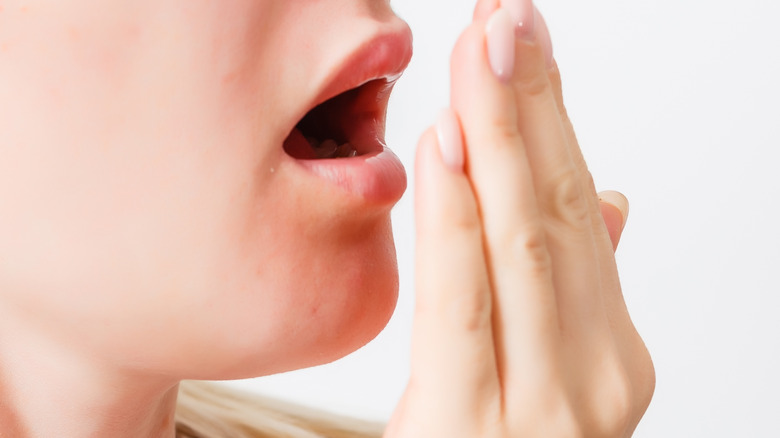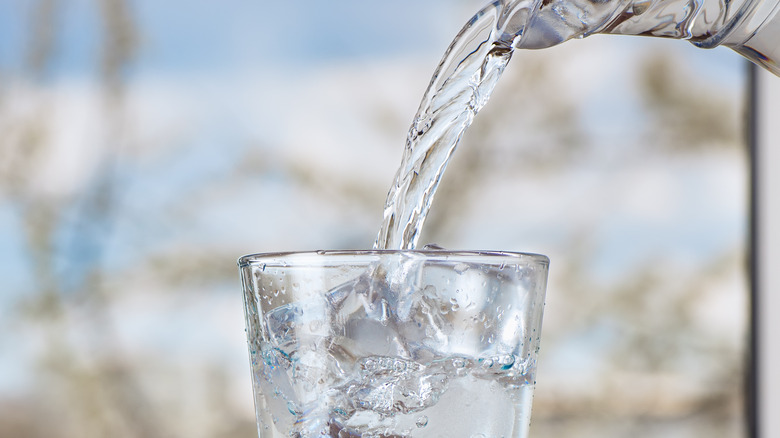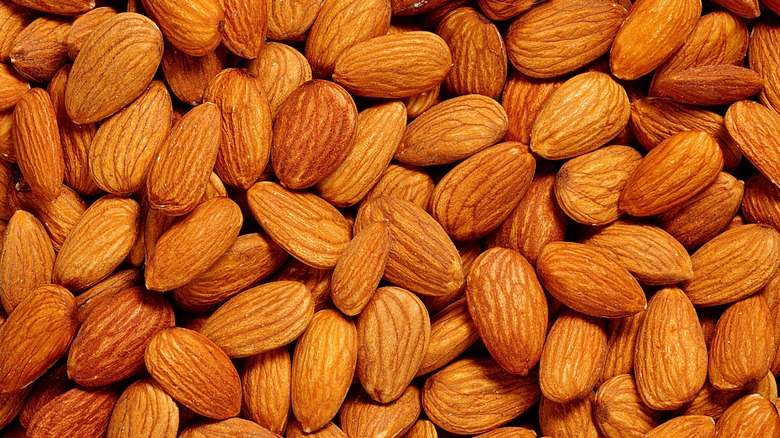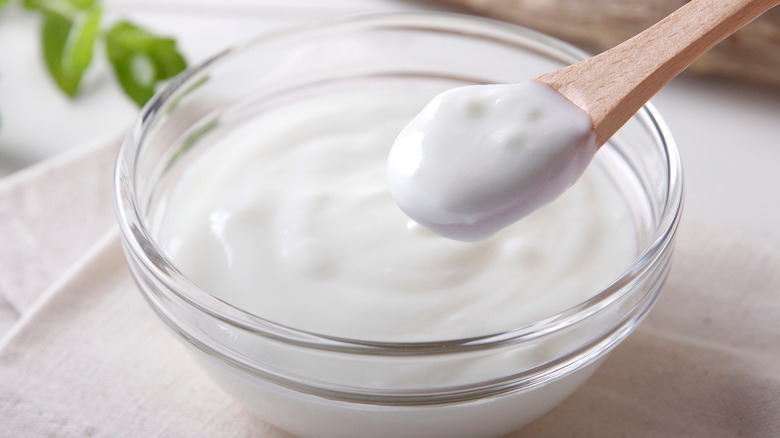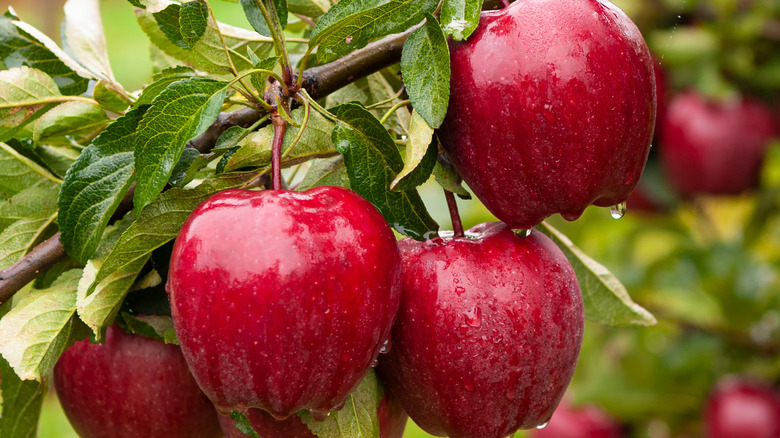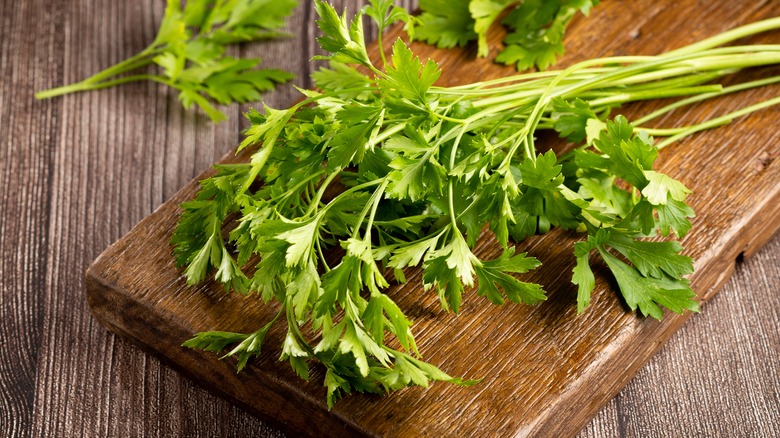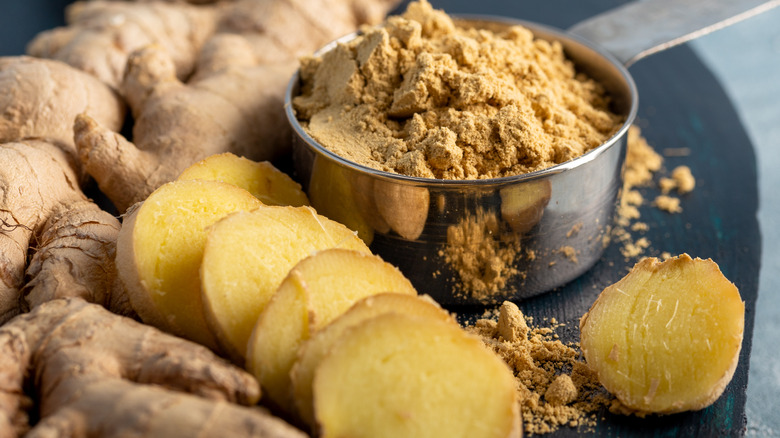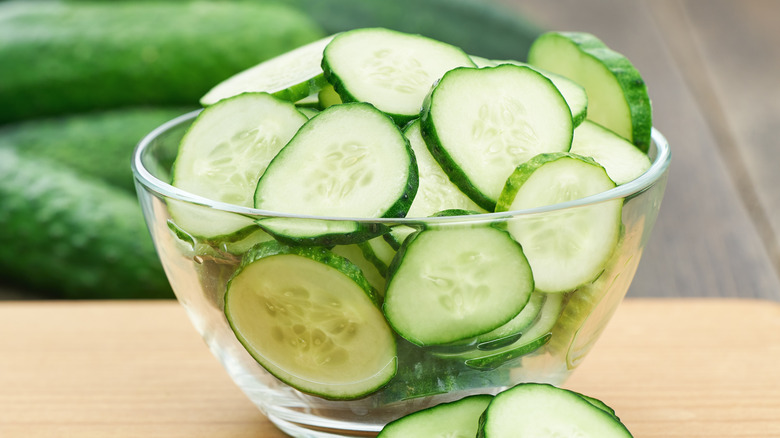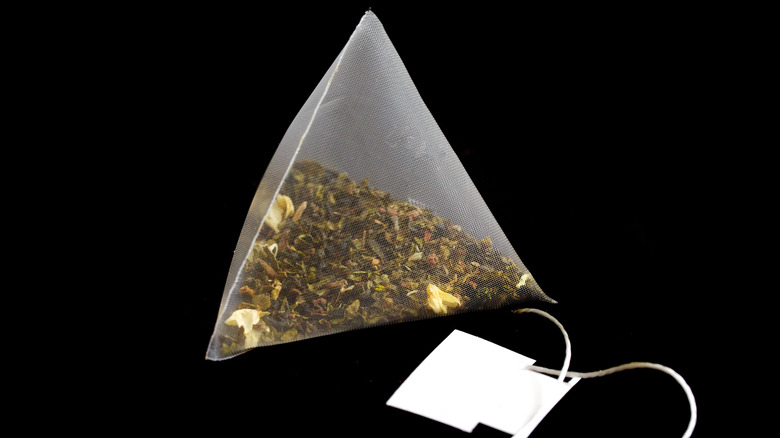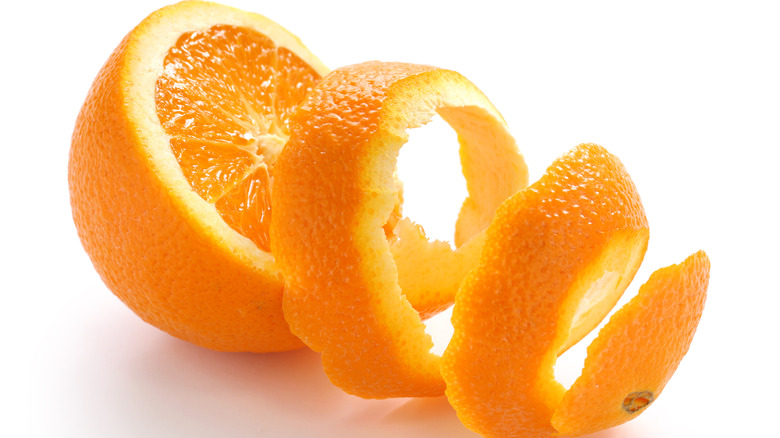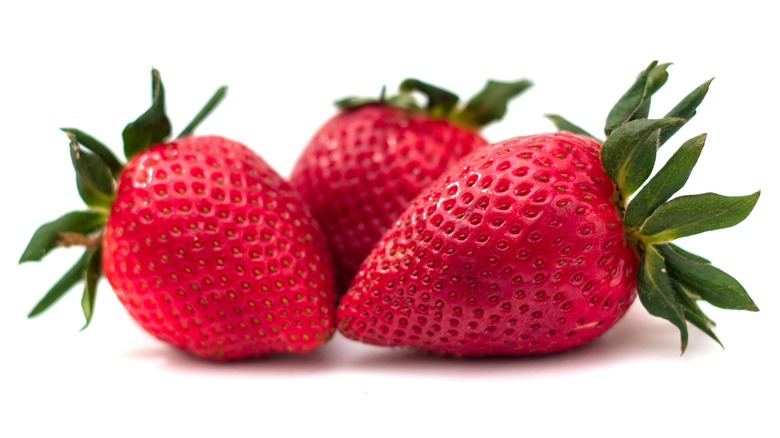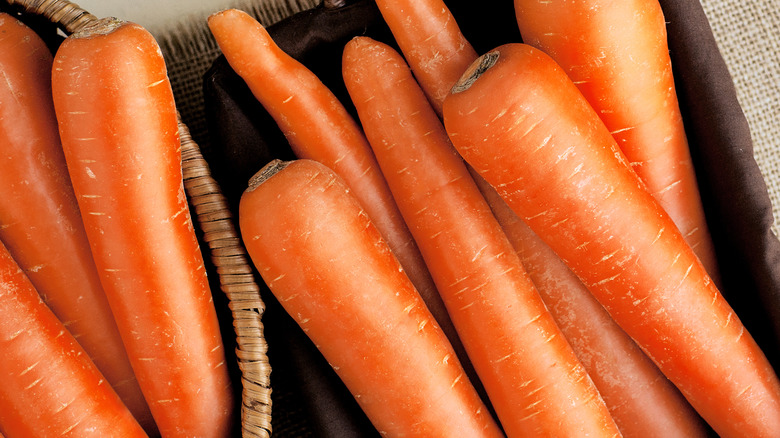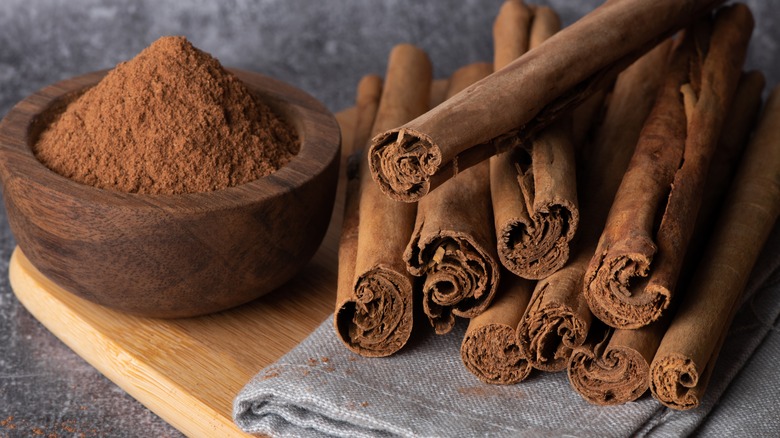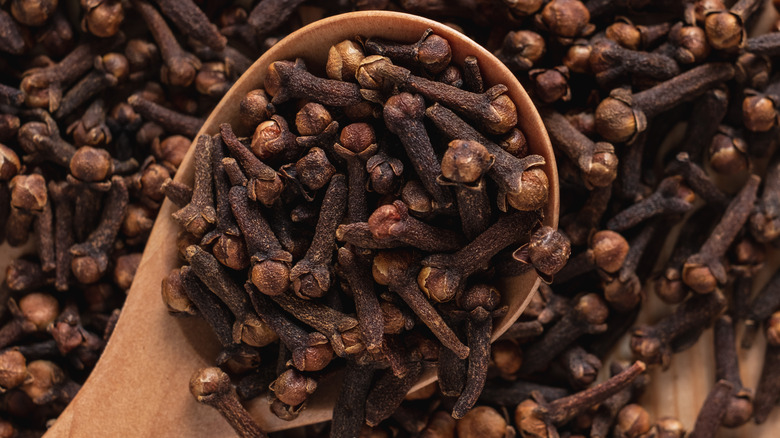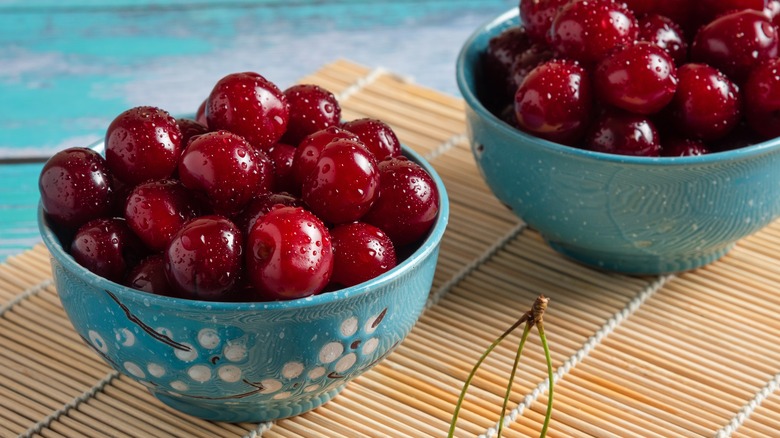14 Foods To Eat For Fresh Breath
When it comes to bad breath, we've all been there. From the infamous morning breath to social situations where you can practically taste your own breath, everyone has had these "I need a mint" moments. But here's the good news. Mints, gum, and even breath spray aren't the only possible ways to freshen one's breath when your mouthwash is nowhere in sight.
Of course, what might help improve bad breath depends on what's causing it in the first place. As the Mayo Clinic explains, halitosis (a.k.a. bad breath) could be because of what foods you're eating, but it goes beyond stinky foods leave stinky food residue behind in your mouth. For one, those bits of food on your teeth can support bacterial growth in your mouth, which can lead to halitosis. Also, some foods like garlic and onions can continue to cause bad breath, even if you thoroughly brush and floss your teeth and use mouthwash. Why? Because after they're digested, they travel via your circulatory system to your lungs.
Additionally, the culprit behind bad breath could also be non-food related triggers like certain medications, dry mouth, poor dental hygiene habits, or medical conditions. The bottom line is if you constantly have bad breath, you should speak with a medical professional to make sure it isn't a sign of a more serious health concern. With that said, we'll explore some of the potential benefits and downsides of different foods that might help to improve halitosis.
Water
Water is a given when it comes to a healthy lifestyle, but that doesn't mean we all take in enough of it every day. Let's be honest, though, the fact it can be a little bland doesn't help. But if you need a little extra motivation to opt for water instead of other beverages, water might help with bad breath in more than one way.
According to ProHEALTH Dental, a major cause of halitosis is bacteria that's had a chance to build up inside of one's mouth. And if you love sugary drinks like soda, guess what? You're basically feeding those bacteria. But if you drink water instead, you help wash away those bacteria, making it less likely that they'll cause halitosis or other issues like tooth decay. And speaking of tooth decay, the Mayo Clinic notes that keeping your teeth, gums, and tongue clean and healthy reduces the chances of pockets forming between the teeth and gums, which can fill with plaque and also cause bad breath. But in addition to proper oral hygiene, water can help by keeping your gums hydrated.
Moreover, drinking the right amount of water daily can help with xerostomia, or what's commonly called dry mouth (via ProHEALTH Dental). When your mouth doesn't produce enough saliva, that can also create the perfect environment for bacteria to thrive and set the stage for bad breath. Water can help boost the amount of saliva one makes and combat this health condition.
Almonds
Whenever you consider any foods for your diet, there are usually some potential pros and cons to think about. Case in point: Almonds might help with halitosis, but that doesn't mean these little crunchy little treats don't have possible downsides when it comes to your teeth.
According to Westlake Smile Design, certain foods can help keep bad breath-causing bacteria from building up on your teeth. Just like how rubbing a toothbrush against your teeth helps break up and remove bacteria, crunching on almonds can have a similar effect. This is because almonds are packed with fiber. Just 100 grams of almonds contain 12.5 grams of fiber, per the U.S. Department of Agriculture (USDA). However, there is a catch. Guardian Direct cautions that the shape and texture of whole almonds can be rough on one's teeth, and even lead to tooth fractures. So, you might want to opt for slivers of almonds to help with halitosis while lowering the chances of tooth damage.
Besides potentially freshening one's breath, WebMD notes that almonds have other possible health benefits, like supporting good bone and heart health. They also might assist with managing cholesterol, blood pressure, weight, and blood sugar. Furthermore, there is data suggesting that almonds might help with gastrointestinal (GI) tract health, which might be beneficial for one's immune system.
Yogurt
When many people hear the word "yogurt," the first thing that pops into their minds is a type of health food. And yes, depending on its ingredients, yogurt can check off a number of possible health benefit boxes, including potentially helping with bad breath.
According to WebMD, a study involving 24 volunteers found that eating three ounces of yogurt twice on a daily basis might help reduce halitosis. The reason, according to the researchers, is a question of fighting fire with fire — or in this case, fighting the bad breath-creating bacteria in one's mouth with the active bacteria in yogurt. Also, the participants had notably reduced levels of other factors that can cause bad breath, like gingivitis and plaque.
Does that mean that yogurt is the ultimate solution for halitosis? Well, like many things, it's not that simple. Even though the findings for this study are promising, more research is needed (via WebMD). And of course, not all yogurts are the same. For example, some can contain added sugar. So, you need to be a conscientious consumer and pick the best one not just to possibly help with bad breath, but also to fit your other health needs. A nutritionist might be able to help you choose specific yogurt brands and products that are best for you.
Apples
Imagine this: You're at a dinner party, when your host brings out their homemade garlic bread. You don't want to be rude, but even as you take a slice, you worry about having bad breath. Fortunately, even if you left your mints and gum at home, you might be able to counteract the garlic easily — if your host serves a certain fruit at dessert time, that is.
As Mint Dental OC explains, garlic has sulfur in it. And as anyone who's ever gotten a whiff of sulfur will tell you, it doesn't exactly smell like roses. Apples, however, contain a compound called polyphenols, which can help break down sulfur. Also, raw apples have a crunchy texture and encourage saliva production, both of which can help clean food residue from one's teeth. Per the Mayo Clinic, food particles that aren't properly cleaned out of your mouth can result in bad breath. Of course, nothing is as effective at keeping your mouth healthy as proper oral hygiene. However, apples can give your regular tooth brushing and flossing routine a little hand.
The best part is, you don't even have to wait for dessert to put your halitosis fears to rest. According to Mind Dental OC, it's smart to have a main dish that has garlic in it along with a side salad that includes apples, as well as other foods that contain polyphenol compounds.
Parsley
Parsley is often touted as a "cure" for bad breath. However, that's not the whole story. In fact, it might be more of a quick (and very temporary) fix than a permanent solution, depending on the cause of one's bad breath.
As Cooley Smiles Everett notes, parsley's reputation as a food that fights bad breath isn't without evidence. After all, like mint, it does have oils that can help freshen one's breath. Plus, the chlorophyll in parsley is deadly to the bacteria in one's mouth (which can be the culprit behind halitosis). So yes, on paper, parsley seems like a good solution for bad breath. But according to the New York Times, more than one study has concluded that while parsley might help mask bad breath odor, it doesn't appear to properly address the potential underlying causes of halitosis. The aforementioned bacteria that cause bad breath do so by creating sulfur compounds, and data doesn't support parsley reducing these compounds.
Despite this, parsley does have another potential benefit for oral health, which might help with halitosis in the process. As Cooley Smiles Everett notes, parsley is rich in vitamin K, which can help keep teeth strong and healthy. However, Dr. Andrew Weil, the founder and director of the Andrew Weil Center for Integrative Medicine at the University of Arizona, warns on his website that vitamin K can interfere with blood thinners. He also advises against taking parsley with water pills, as well as lithium.
Ginger
Ginger has many potential health benefits, including possibly reducing bad breath. The secret to ginger's possible halitosis-fighting properties is that it contains a compound aptly called gingerol (via NDTV). When one eats ginger, gingerol affects a type of enzyme located in the mouth, leading to different compounds that can cause bad breath being broken down.
Additionally, gingerol has antibacterial properties, which can not only reduce the chances of developing bad breath, but also protect one's teeth and gums. As dentist Dr. Larry Saylor says on his website, the bacteria that cause periodontal disease (also called periodontitis) is a major cause of halitosis. In fact, this type of bad breath has a special name in the dental industry: "perio breath."
So, if you want to give ginger a try to combat halitosis, you might want to have a cup of ginger tea after eating (per NDTV). On top of helping with bad breath, there's also evidence suggesting ginger could aid in managing cholesterol, as well as soothing digestive issues. And if you suspect that you have periodontal disease, make an appointment to see your dentist as soon as possible. Periodontitis can eventually damage the jawbone, especially if not properly treated (via Dr. Larry Saylor).
Cucumbers
They're great in salads. They can add a dash of flavor to water. You can use them to make tzatziki sauce even if you're on a vegan diet. Combining them with tomatoes creates a nice base for gazpacho. There are plenty of options for incorporating more cucumber into your diet — and that can be good news for someone with bad breath.
Cucumbers have high water content, which (as WebMD points out) can be helpful for one's oral health. They encourage your mouth to produce saliva, and according to Westlake Smile Design, that can help with halitosis. In fact, Nth Degree Orthodontics recommends eating cucumbers unskinned to keep one's gums healthy, as well as to help rid one's teeth of food particles and prevent bad breath.
With that said, while cucumbers might help with halitosis, they might not be a good choice for everyone. Medical News Today cautions that the vitamin K in cucumbers could interfere with blood thinners like warfarin (Coumadin). This is because vitamin K can help one's blood clot. So, if you take blood thinners and want to add cucumbers to your diet for any reason, it's important to speak with a medical professional first.
Tea
There is evidence supporting the idea that drinking either green tea or black tea could help with halitosis — and that's just one of the potential oral health benefits of these popular drinks.
According to WebMD, a study done at Pace University found that green tea extracts impeded different types of bacteria from growing. Amongst those tested in this study included the kind that causes tooth decay. This alone makes green tea a potential bad breath fighter, since oral health problems and bad breath can go hand in hand. The research also concluded that adding green tea to products like toothpaste could create a one-two punch when it comes to bacteria and viruses.
Additionally, the reason why both green tea and black tea could be good for bad breath is because both teas contain potential halitosis-fighting compounds called polyphenols (via Great Smile Dental). In fact, black tea might help keep bacteria and plaque in check. Another study tested black tea extracts against three different bad breath causing bacteria (per WebMD). Lead researcher Dr. Christine D. Wu spoke about the study's findings in a news release, stating that "[b]esides inhibiting the growth of pathogens in the mouth, black tea and its polyphenols may benefit human oral health by suppressing the bad-smelling compounds that these pathogens produce."
Orange rind
It's not uncommon for someone to bite into an unpeeled apple. But chances are if someone sunk their teeth into an orange with its peel still on, you'd find it unusual (and maybe even a little unpleasant). However, chewing on the rind of an orange might be helpful if you have halitosis.
According to Hicks Dental Group, orange rinds contain citric acid. Chewing on an orange rind releases that acid into your mouth and encourages the production of saliva, which can wash away food particles and help keep your breath fresh. In addition, Healthline notes that the peel of an orange contains large quantities of polyphenols, compounds that might help with halitosis (per Great Smile Dental).
With that said, if you do want to try eating an orange peel, remember that it can be hard to digest. Additionally, orange peels tend to be bitter and tough to chew. Also, as an article in the Proceedings of the Estonian Academy of Sciences, Chemistry states, orange peels can contain pesticides, so make sure to wash oranges with hot water before consumption. Hicks Dental Group recommends choosing organically grown oranges to avoid pesticides altogether (though you should still wash oranges before eating them, even if you go organic).
Strawberries
Strawberries have a bit of an identity crisis. Despite their name, they're technically not true berries; they're actually "accessory fruits," according to Britannica. But no matter how you want to think of them, strawberries might be a good addition to a bad breath-fighting diet.
As s.m.i.l.e. dental explains, dry mouth and bad breath can go hand in hand. Basically, there's a chain reaction that can occur when one's mouth isn't making the right amount of saliva. Lower saliva levels can lead to bacteria growing and causing halitosis. And in case you're wondering, yes, dry mouth can be the culprit behind morning breath. The good news is that strawberries can help with dry mouth in several ways. First, the U.S. Department of Agriculture (USDA) states that 100 grams of raw strawberries have 90.8 grams of water. That alone means they could help with dry mouth. Second, they can stimulate your salivary glands to start pumping out more saliva. And third, they're a great source of something that might help keep mouth bacteria from thriving: vitamin C. As a matter of fact, 100 grams of raw strawberries contain almost 60 milligrams of vitamin C.
Although strawberries might help with halitosis, it's possible to have an allergic reaction to them (via Healthline). In severe cases, a strawberry allergy can cause dizziness, an accelerated pulse, swelling in the throat, a drop in blood pressure, and even unconsciousness.
Carrots
From soups to salads to even heart-healthy cake, carrots are featured in many different recipes. What's more, adding them to your diet could be a good move if you want to freshen your breath. As Hanson Dental notes, carrots can help one's oral health — and by extension, help with halitosis — in a few ways. For starters, carrot juice helps remove food particles and bacteria from one's teeth and gums. Also, eating carrots encourages your salivary glands to make more saliva, which can also help with bad breath-causing bacteria. The fiber in carrots can also help in eliminating bits of food residue from the teeth, gums, and tongue.
However, the type of carrot you buy can make a difference. For example, the U.S. Department of Agriculture (USDA) explains that 100 grams of mature raw carrots have 87.7 grams of water and 3.1 grams of fiber. However, the same amount of raw baby carrots have more water (89.3 grams) and less fiber (2.7 grams), per USDA. And the differences in potential health benefits don't stop there. According to the USDA, those same 100 grams of raw baby carrots have 42 milligrams of calcium — more than what you'll find in 100 grams of mature raw carrots (30 milligrams). It's worth noting, though, that mature carrots beat out baby carrots in terms of potassium and phosphorus content.
Cinnamon
Cinnamon could be a big help in the fresh breath department, but choosing how you want to consume it may take a little shopping around.
As Northview Dental Associates notes, chomping on a cinnamon stick is an old-school way of reducing bad breath. Not only is cinnamon a pleasant scent (certainly more pleasant than bad breath odors), but it also has oil with antibacterial properties. In fact, a study in the Archives of Oral Biology that tested ten different essential oils found that cinnamon oil is a bad breath-fighting standout, and recommended it as a possible effective ingredient for oral hygiene products. A major reason behind this finding was cinnamon's impact on a bacterium called Solobacterium moorei, which produces hydrogen sulfide. In the study, cinnamon oil was shown to reduce H2S production, subsequently helping to reduce bad breath.
Although cinnamon might be a good choice for freshening one's breath, it's important to remember that there are differences between cassia cinnamon and Ceylon cinnamon (via Healthline). While cassia is more widely available and less expensive than Ceylon, it also has a potentially toxic component called coumarin. So, whether you want to incorporate more cinnamon in your diet for fresh breath or other reasons, you might want to opt for Ceylon, even though it's harder to find and pricier.
Cloves
Would you swallow a piece of chewing gum? In all likelihood, you wouldn't (and you might even find the idea a bit gross). And even though they can help fight bad breath, you'll want to treat cloves the same way.
According to Britannica, cloves are an especially common ingredient for Christmastime recipes made in the U.S. and Europe (like mincemeat and wassail). However, the reason why it might help with bad breath is because of an oil in it called eugenol (via Preferred Dental Care). Eugenol is said to help kill the bacteria in one's mouth responsible for bad breath. Aside from that, dentists use eugenol as an analgesic due to its pain-dulling properties (per Merriam-Webster Dictionary).
The bottom line is that when it comes to eugenol and bad breath, a little goes a long way. In fact, Preferred Dental Care recommends only placing one clove in your mouth, biting down on it, moving it around your mouth using your tongue, and then spitting it out. They also advise against using clove oil or powdered cloves instead of a single clove, since both the oil and the powdered form could cause burns inside your mouth. Additionally, Drugs.com cautions that a person can have an emergency-level allergic reaction to cloves, which can cause symptoms like breathing issues, hives, and a swollen tongue.
Cherries
Need a little assistance with bad breath? Cherries could be the perfect snack for you. According to Welch Dental Group, different bacteria in the mouth create a kind of odorous gas called methyl mercaptan. As it turns out, cherries are among the foods that can break down methyl mercaptan gas, which can positively impact halitosis.
Anyone who has ever tried buying cherries at the supermarket would know that there's more than one kind. As Consumer Reports points out, there are sweet ones (like Bing cherries) as well as tart or sour varieties (like Montmorency). But here's the good news — they're all great sources of halitosis-fighting polyphenols (per Great Smile Dental).
In addition, both sweet and tart cherries are packed with vitamin C, albeit in different amounts (via Consumer Reports). A cup of sweet cherries has roughly 10% of the total amount of vitamin C you should take in daily, while a cup of tart cherries has 16%. Still, it's a good idea to snack on either variety to fight bad breath, as halitosis-causing bacteria are less likely to flourish in the mouth of a person who takes in the right amount of vitamin C daily (per s.m.i.l.e. dental).

